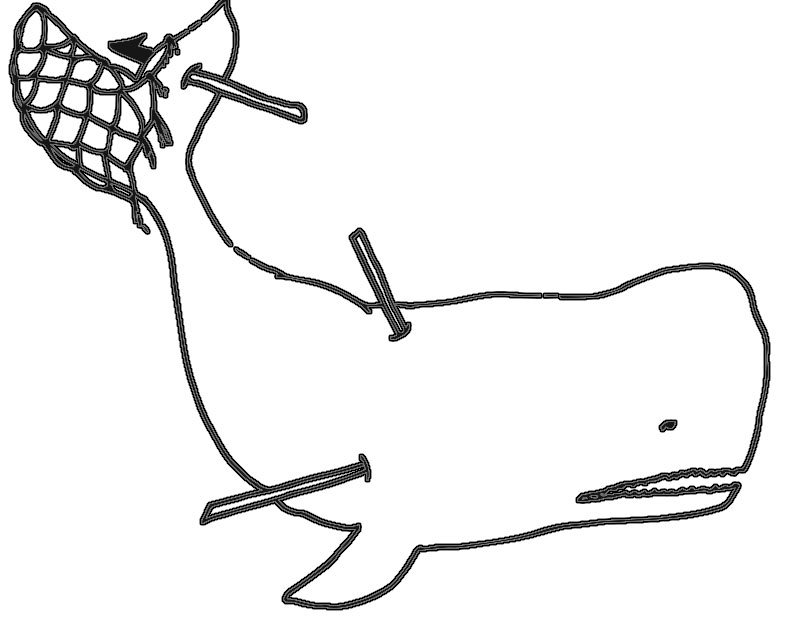After a productive discussion, Moby Dick is back out to sea
Credit: Olivia Weinberg
October 22, 2016
About ten years ago, Moby Dick was removed from the curriculum and returned due to popular demand. Recently, it was removed again, due to the length of the book and new curriculum tailored more to students’ development and enjoyment The workload and the way in which Moby Dick was taught made the novel a more feasible task for students in the past. Due to the change in both the English department’s approach to Moby Dick and in student life, the book’s removal is beneficial to the student body because it opens English students to a variety of books.
English teacher and alumnus Michael Canterino who studied Moby Dick when he attended Hackley, said, “When I was in school, it was a 12th Grade book. It was second semester in the spring. So theoretically, everybody was in college, and it was something that everybody could just dive right into.”
In the 1980s and 90s, the novel was followed by a creative project. English teacher Christopher Arnold, who taught the book to juniors and seniors, said, “There was a Moby Dick project that was strictly creative, so you had to do something that was whale-themed in some way….You could put a tail on your car, which was done one year.” His favorite of the projects was a pair of harpoons one student made, sharp enough to hunt a whale.
When Moby Dick was first in the curriculum, the challenge of reading the book was easier to conquer because it was assigned in senior spring and was more centered around creative projects rather than analytical writing. Recently, along with reading around 40 pages each night, juniors were asked to analyze and write lengthy journal entries. At the end of the first trimester, juniors were assigned an essay, which was a huge undertaking given the density and length of the 624-page novel.
The goal of the removal of Moby Dick was to improve Hackley students’ English experience and development. English Department Chair Richard Robinson said, “We also want to give students many different experiences in interpreting a number of texts and the difficulty in that situation is that Moby Dick is a long book… that it practically drives other books out of the way.”
Dr. Robinson concluded, “The goal in removing Moby Dick in this most recent range is ultimately to provide more opportunities for students to read more deeply, to conquer these books, to develop the skills of conquering a variety of many different texts.”
Students’ opinions were also a big factor in the English department’s consideration of Moby Dick. In recent years, the English department began a system in which they create a poll for freshman to vote on which books they would read their senior year.
In addition to this, Dr. Rob said, “We had all taught it for quite a while by the time that we got there. It helps to have a teacher really enthusiastic and engaged with the text they’re working, so variation is a natural part of it.”
The new novel in it’s place is The Sound and the Fury by William Faulkner.
Although the teachers may not favor the novel for Hackley juniors, a number of students enjoyed the read and Mr. Canterino says most teachers still believe that Moby Dick is “one of the best American novels you can possibly teach.”
Senior Jordan Schwartz says, “Moby Dick was the only book I really enjoyed in 11th Grade English. I liked the psychological and humorous element.” Various seniors the Dial spoke to expressed mixed feelings about the book and their experience because of the length and complexity.
Junior English teachers agreed on their love for Moby Dick but also their concerns over the time commitment the book requires and it’s conflicting role in student life. Mr. Arnold is in the process of creating an elective for seniors, as a solution to the void in the English curriculum, that will be centered around Moby Dick. As its themes to be considered and discussed are numerous, an entire school year spent on the book would allow for students to read and explore it in greater depth.
This elective would include a reading marathon every year and possibly a trip to the New Bedford Whaling Museum that has a replica of the ship from Moby Dick.
Although Moby Dick has been a significant part of the Hackley culture for decades, the decision to remove the novel was made because an analytical and essay based approach is no longer feasible for increasingly busy Hackley students. The removal will prove to be beneficial to future Hackley English students, by offering them a chance to explore and interpret a variety of different books that will replace Moby Dick.

